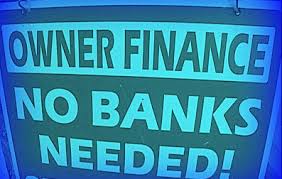I love everything about banks but I realize I might hold a minority view on that one. Maybe you don’t like banks as much as I do. If so, this one’s for you.
Today is about seller-financing, which is a way to cut out banks from a traditional bank function.
Seller-financing happens when:
- Traditional banks can’t or won’t lend money to facilitate the sale of something expensive. Usually, but not always, real estate.
- The buyer doesn’t have enough cash to buy the thing outright and needs to make installment payments, and
- The seller doesn’t mind being paid in installments, including interest, over time.
Traditional banks have their comfort zone for lending. Situations that fall outside of their comfort zone become eligible for seller-financing. Typically there’s something non-standard about the property or the buyer or the situation that makes a bank loan impossible. Or sometimes, more simply, buyer and seller don’t prefer to use a bank for some reason, so they agree to structure up a loan directly from the seller to the buyer.
I sat down for lunch recently with Bill and Alison Mencarow of Kerrville, Texas, publishers of The Paper Source newsletter, which is the single most important source of wisdom and advice on creating, buying, and selling seller-financed notes.
 I’ve been an off-again, on-again subscriber to their newsletter for a dozen years now, but to my chagrin had never met them in person, despite the fact that they live just a short ride up the road from me.
I’ve been an off-again, on-again subscriber to their newsletter for a dozen years now, but to my chagrin had never met them in person, despite the fact that they live just a short ride up the road from me.
I don’t necessarily recommend you get involved as a buyer, seller, or investor in seller-financed notes. Because, well, read on. But if you DO ever decide to get involved, you have to subscribe to their newsletter.
Anyway, I used to invest in this business, as a purchaser of secondary seller-financed notes, bought at less than face value. When all went well, as a buyer I would collect regular interest and principal payments. If the note payer refinanced or sold their property I would get paid off early, and I would make an even higher return than the stated interest rate on the note because of the discount at which I bought the note. It can be, and was at times, a lucrative business.
I prefer to write about finance topics for which I have some expertise. What’s an expert, you ask? I define an expert as someone who has lost money doing that financial activity. By that definition, I am a clear expert in seller financing.
What I like best about the Mencarow’s newsletter is that while they support investors in the seller-financed notes business, one of their main themes is how things can go wrong. Like, really wrong.
In my old investment days, I purchased seller-financed residential mortgages, seller-financed commercial mortgages, and seller-financed business notes. In the creation of these seller-financed notes, almost by definition, something non-standard is going on.
Maybe the buyer has weak or non-existent credit and the traditional bank turned them down for a loan. Maybe the buyer did not have a sufficient down payment for a bank loan. Maybe the property needed a ton of renovation, so could not get appraised near the selling price. Or maybe, similar to the “all-cash” theme I wrote about last week, the participants in the transaction prefer to avoid banks so that their financial activity remains “invisible” to financial authorities. Any one of these scenarios increases the risks for the person collecting installment payments over time.
I’ve also been on the other side of the transaction, offering installment credit to a buyer so that I could unload a property more quickly. I used this technique to sell a 4-unit commercial property in upstate New York that needed renovation. Two separate buyers defaulted on the notes, one after the other, and twice the property came back in my possession. In each case the property returned in worse condition than before. All the copper wiring got stripped out of the property one of those times, as it turned out my buyer had a, let’s say, familiarity with folks who knew how get a good price for scrap metal. Seller-financing to him did not lead to a happy result for me.
 I’ve also had numerous experiences of people ceasing to pay on their notes. Sometimes they pay a bit late, and then a little bit later still, and then the payments just stop coming. I’ve spent more time than I care to admit writing letters, sending emails, making phone calls. Sure, I’ve hired lawyers to enforce on the notes too. Sometimes this works and sometimes you end up taking a big loss.
I’ve also had numerous experiences of people ceasing to pay on their notes. Sometimes they pay a bit late, and then a little bit later still, and then the payments just stop coming. I’ve spent more time than I care to admit writing letters, sending emails, making phone calls. Sure, I’ve hired lawyers to enforce on the notes too. Sometimes this works and sometimes you end up taking a big loss.
The Mencarow’s newsletter serves as a guide to common mistakes in buying and enforcing payments on notes, including fraud, as well as the many ways investors can get way over their head or underwater through seller-financing.
Experiencing this a few times partly explains why I appreciate banks a lot.
A version of this post ran in the San Antonio Express News and Houston Chronicle
Post read (296) times.




